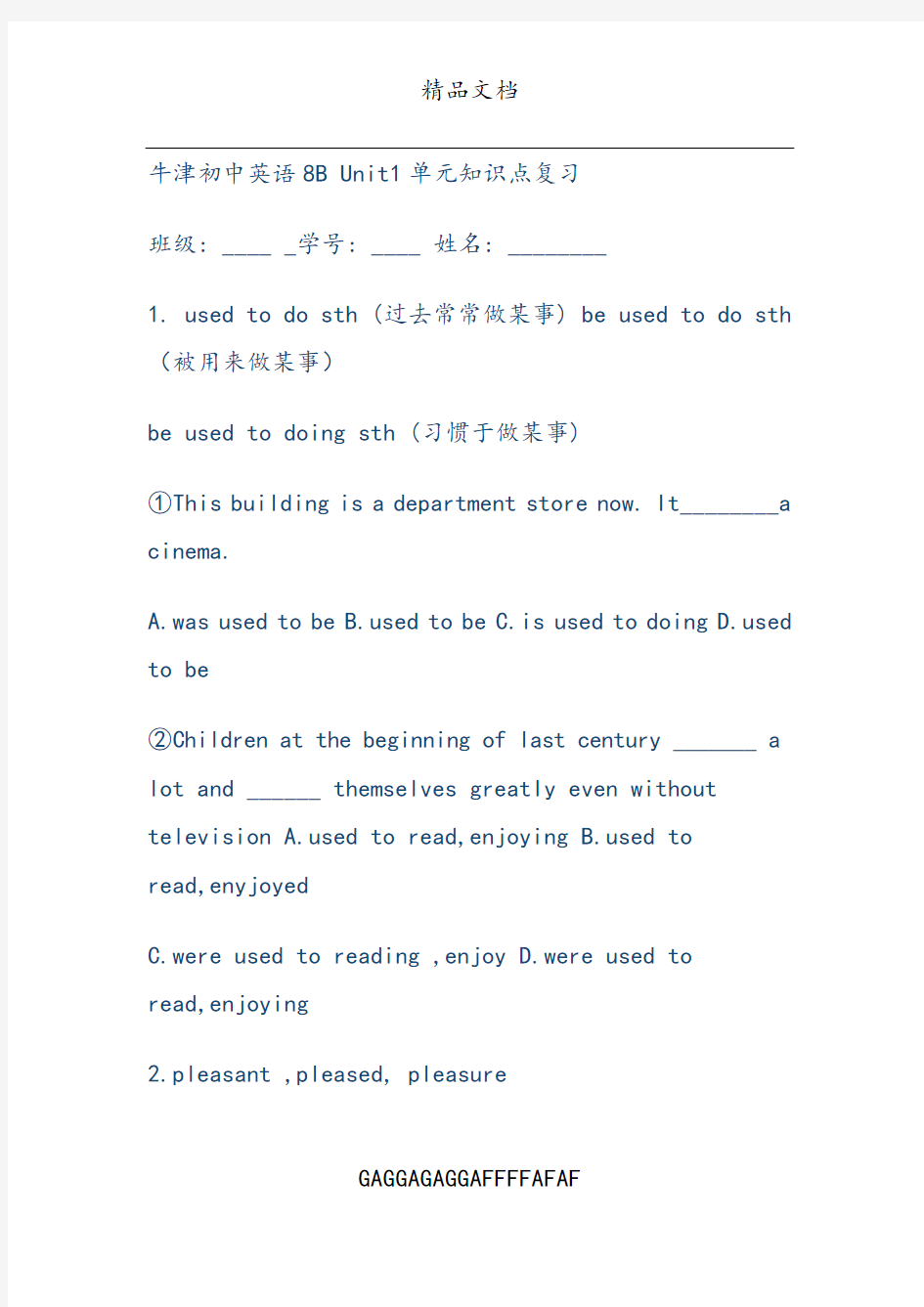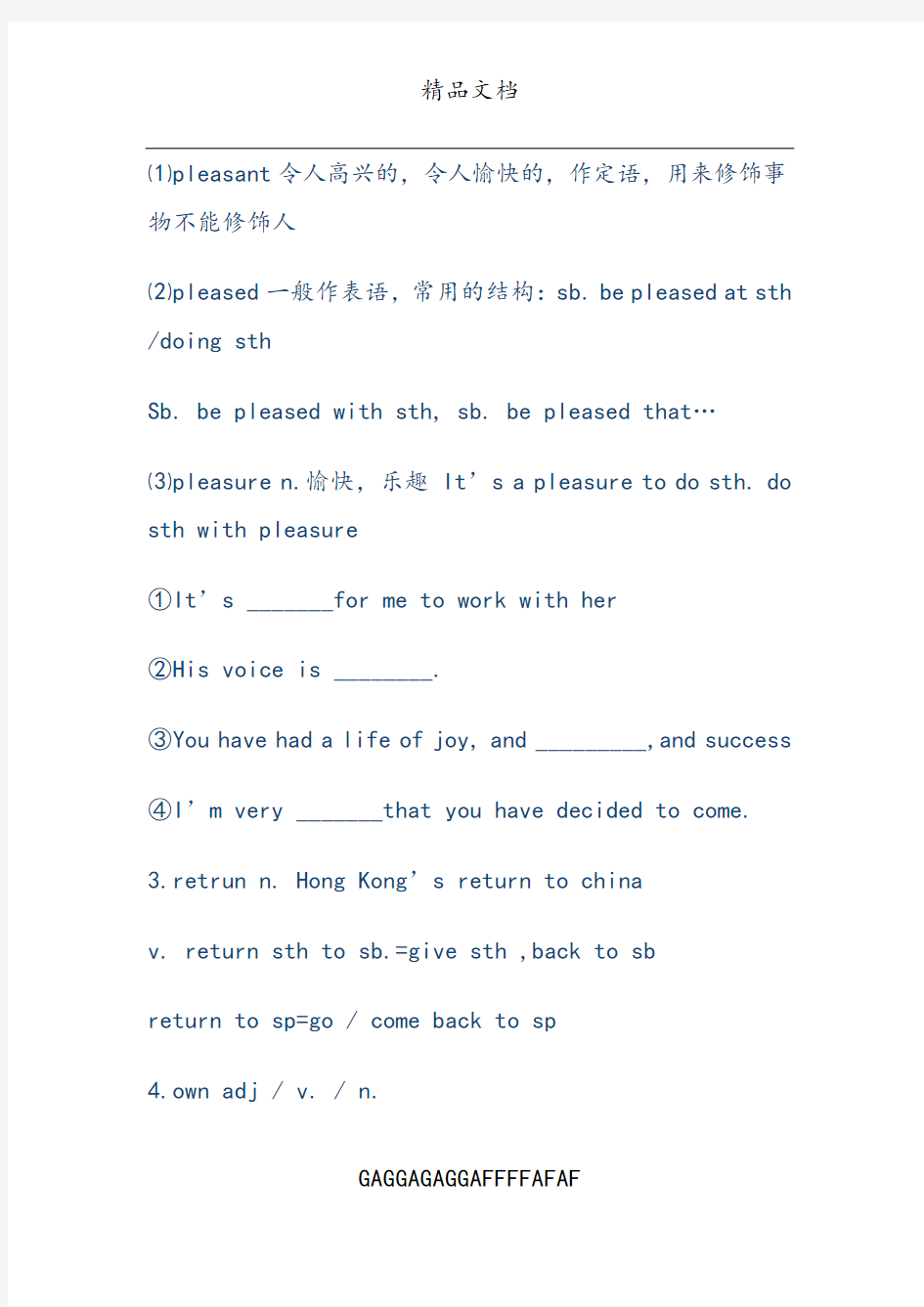

牛津初中英语8B Unit1单元知识点复习
班级: ____ _学号: ____ 姓名: ________
1. used to do sth (过去常常做某事) be used to do sth (被用来做某事)
be used to doing sth (习惯于做某事)
①This building is a department store now. It________a cinema.
A.was used to be
https://www.doczj.com/doc/a6362616.html,ed to be
C.is used to doing
https://www.doczj.com/doc/a6362616.html,ed to be
②Children at the beginning of last century _______ a lot and ______ themselves greatly even without television https://www.doczj.com/doc/a6362616.html,ed to read,enjoying https://www.doczj.com/doc/a6362616.html,ed to
read,enyjoyed
C.were used to reading ,enjoy
D.were used to
read,enjoying
2.pleasant ,pleased, pleasure
GAGGAGAGGAFFFFAFAF
⑴pleasant令人高兴的,令人愉快的,作定语,用来修饰事物不能修饰人
⑵pleased一般作表语,常用的结构:sb. be pleased at sth /doing sth
Sb. be pleased with sth, sb. be pleased that…
⑶pleasure n.愉快,乐趣It’s a pleasure to do sth. do sth with pleasure
①It’s _______for me to work with her
②His voice is ________.
③You have had a life of joy, and _________,and success
④I’m very _______that you have decided to come.
3.retrun n. Hong Kong’s return to china
v. return sth to sb.=give sth ,back to sb
return to sp=go / come back to sp
4.own adj / v. / n.
GAGGAGAGGAFFFFAFAF
①This is /his _______house (自已的)=This house is his________
②他父亲有一面大镜子。(own)
______________________________
③我有一个自己的电脑(of one’s own)
_________________________
④on one’s own 独立地他独自收集了许多关于香港的信息.
__________________________________________
5.win ,beat , hit
We are sure we can ____them.
I’m very pleased when the boys ________the relay race. He was ________ by a falling stone.
They ________us at basketball last week .
6.take off ①起飞 (反)land ②脱下 (反)put on .
GAGGAGAGGAFFFFAFAF
The plane ________at 7am. ___________your gloves , they are wet.
7.marry v. marry sb /marry sb to sb.
get/be married be married to sb .
Sally wants to _______ Bob, so she went to the country with him.
A, get married B, marry C, marry with D, get married ①他们把女儿嫁给一个老富翁
______________________________________________.
②他们结婚已10年了
___________________________________________________ __.
8, a bit +adj./ adv. = = a little + adj. / adv.
a little + u.n. = = a bit of + u.n.
There is _________ (有点) water in the glass.
I find the watch a bit expensive.
GAGGAGAGGAFFFFAFAF
A, much more B, very C, a little D, too
9, 现在完成时:构成:S+have/has+Vpp
用法:(1)表示过去发生或已经完成的某一动作对现在造成的影响或结果。常与just, yet, ever, never,already, before 连用。
1.Have you ________ been to Beijing? No, _____.
2.I have ______ finished my work.(已经).
3.They have ______ left here. (刚刚)
4.I have ______ (从来没有)met such a man __________. (以前)
(2)表示动作或状态开始于过去, 一直延续到现在, 甚至还可能继续延续下去. 常与for , since, so far, in the past/ last +一段时间, recently 等连用。动词用延续性动词。常见的非延续性动词与延续性动词的转换。
come/go –be in/on go out-be out leave – be away begin/start – be on buy – have borrow – keep join – be a member die – be dead catch a cold – have a
GAGGAGAGGAFFFFAFAF
cold become – be fall asleep – be asleep open – be
open get to know – know close-be closed
1.He died twenty years ago.
1) He ___ ____ _____for twenty years. 2) Twenty years ____ ____ _____ he died.
2.Jim came to the city last year.
1)Jim ___ ____ ____the city____one year. 2) ____ one year _____ Jim ____ ____ the city.
3) One year ____ _____ _____ Jim ____ to the city.
3.The exciting film began 5 minutes ago.The exciting film ____ ____ ___ ____ 5minutes ago.
(3)have (has) been to sp.曾经去过某地,(或多少次)而现在不在某地
have (has) gone to sp. 已经去了或正在去某地的路上have (has) been in sp 在某地(多久)
1).The twins are not at home. They _________ the West
Hill Farm.
GAGGAGAGGAFFFFAFAF
2).A: Where ________you________? I’m looking for you.B: I _________ the library.
3).---How long ______ his uncle _______ Germany?
--- I don’t know. But I know that he __________ there many times.
4).We can’t find Zhang Ming .Where ___ he __?
A. does, go
B. does, gone C did , gone D. has , gone
5).Neither you nor Jim ___ to Japan.
A have been B. has been C. went D. has gone
6).Where is your mother ? She ___ Shanghai. She won’t be back ___ next week.
A. has gone to ,until
B. has been to , until
C. has been to ,after
D. has gone to , after
八年级上册Units 4--6知识归纳
一、词语辨析:
GAGGAGAGGAFFFFAFAF
1、arrive, get, reach
arrive不及物动词,后面要跟in或at。表示到达大城市或国家时要用in,而到达小城市、乡村、车站等小地方则用at。如:
We arrived in London last week. 我们上周到达伦敦。The doctor arrived at the village at last. 医生终于到达了那个村子。
reach是"独行侠",是及物动词,后面从来不跟介词,直接跟宾语(地点名词)就行了。如:
When did you reach the station? 你是什么时间到达车站的?
He reached Nanjing at noon. 他是中午到达南京的。
get是不及物动词后面要接to再接地点名词,.当“到达”的地点是副词时,就不带它了。如:
Ann got to the farm at six o‘clock. 安六点钟到达农场.
I got here early in the morning. 我一大早就到这儿了.
注意:如果不指明到达的地点就不能用get,而要用arrive.
GAGGAGAGGAFFFFAFAF
如:
When I arriv ed, they weren‘t there. 当我到达时,他们不在那儿.
2、sick, ill
(1)都可译为“生病的”。ill只在系动词后作表语:
Her mother was ill in bed. She feels ill today.
但sick既可作表语: Her mother was sick / ill in bed. (作表语常是美国英语用法)
也可作定语(即后接名词):Jane is taking care of her sick mother.
(此处是定语,不可用ill. 原因见下文ill用法)
(2)若ill作定语,译为“坏的,恶劣的”an ill person 一个坏人
sick作表语时也常译为“恶心的,想吐的”。
The boy always feels sick when he travels by car. 3、other, another, the other
another与the other 和others 与the others都来源于
other这个词。
GAGGAGAGGAFFFFAFAF
其用法是:
another泛指三个或三个以上的人或物中没有确定的另一个;
another+数字+名词= 数字+more+名词;
the other则指已知的两个人或两事物中的另一个。(one…,the other….)
others或 other+ 名词,泛指“别的人或别的物”;
the others指“一定范围内的其余的人或物”。
注意:若强调确定数目中的“一(几)个”与其余的,用one...the others或“the other +复数名词”结构。
经典考例:
1) Shanghai is really a fascinating city and weve decided to stay for ________ two weeks. (2003上海卷)
A. another
B. other
C. the other
D. other’s
2) If you want to change for a double room you’ll have to pay ________ $15.(NMET 2000)
A. another
B. other
C. more
D. each
3) One of the sides of the board should be painted yellow,
GAGGAGAGGAFFFFAFAF
and ________ . (2000京、皖春季卷)
A. the other is white
B. another white
C. the other white
D. another is white
4) Sarah has read lots of stories by American writers. Now she would like to read ________ stories by writers from ________ countries.(NMET ’97)
A. some; any
B. other; some
C. some; other
D. other; other
5) -Have you finished your report yet?
-No, I’ll finish in ________ ten minutes.(NMET ’95) A. another B. other C. more D. less
KEYS:AACCA
二、形容词,副词的比较级、最高级
(一)、规则变化
1.一般在词尾直接加er或est,例如,tall-taller-tallest,long-longer-longest
2.以不发音的字母e结尾的单词在词尾直接加r或st,例如,
nice-nicer-nicest
GAGGAGAGGAFFFFAFAF
3.以辅音字母+y结尾的词,把y变为i,再加er或est,例如,heavy-heavier-heaviest
4.重读闭音节,末尾只有一个辅音字母,双写这个辅音字母,再加er或est,例如,big-bigger-biggest
5.部分双音节词和多音节词分别在原级前加more构成比较级和most构成最高级,例如,slowly-more slowly-most slowly;beautiful-more beautiful-most beautiful (二)、形容词,副词等级的用法
A、原级的用法
1.只能修饰原级的词,very,quite,so,too
例如,He is too tired to walk on.他太累了以至于不能再继续走了。
My brother runs so fast that I can‘t follow him.我弟弟跑得那么快以至于我跟不上他。
2.原级常用的句型结构
(1)“甲+be+(倍数)+as+形容词原级+as+乙”表示“甲和乙程度相同”或“甲是乙的几倍”
例如,Tom is as old as Kate.汤姆和凯特年龄一样大。
GAGGAGAGGAFFFFAFAF
Tom is twice as old as Kate.汤姆的年龄是凯特的二倍。
“甲+实意动词+(倍数)+as+副词原级+as+乙”表示“甲和乙程度相同”或“甲是乙的几倍”
例如,Tom runs as fast as Mike.汤姆和迈克跑得一样快。Tom runs twice as fast as Mike.汤姆跑得速度是迈克的二倍。
(2)“甲+be+not+as/so+形容词原级+as+乙”甲不如乙…
例如,This room is not as/so big as that one. 这个房间不如那个大。
“甲+助动词+not+动词原形+as/so+副词原级+as+乙”甲不如乙…
例如,He doesn’t walk as slowly as you.他走路不像你那样慢。
B、比较级的用法
1.可以修饰比较级的词,much,a lot,far,…的多a little,
a bit,…一点儿even甚至,still仍然
例如,Lesson One is much easier than Lesson Two.第一
课比第二课容易得多。
GAGGAGAGGAFFFFAFAF
Tom looks even younger than before.汤姆甚至比以前更
年轻。
This train runs much faster than that one.这辆火车比那辆跑地快。
She drives still more carefully than her husband.她开车仍然比她丈夫还认真。
2.比较级常用的句型结构
(1)“甲+be+(倍数)+形容词比较级+than+乙”表示“甲比乙…”或“甲比乙…几倍”
例如,Tom is taller than Kate.汤姆比凯特高。
This room is three times bigger than that one.这个房间比那个大三倍。
“甲+实意动词+(倍数)+副词比较级+than+乙”表示“甲比乙…”或“甲比乙…几倍”
例如,I got up earlier than my mother this morning.我今天早晨起床比我妈妈还早。
He runs three times faster than his brother.他跑的速
度比他弟弟快三倍。
GAGGAGAGGAFFFFAFAF
(2)“甲+be+形容词比较级+than+any other+单数名词(+介
词短语)”表示“甲比同一范围的任何一个人/物都……”,含义是“甲最……”。
例如,The Yangtze River is longer than any other river in China.
=The Yangtze River is longer than any of the other rivers in China.长江比中国的任何一条其他的河都长。
=The Yangtze River is longer than the other rivers in China.长江比中国的其他所有的河都长。
=The Yangtze River is the longest river in China.长江是中国最长的河流。
注意:The Yangtze River is longer than any river in Japan.长江比日本的任何一条河都长。
“甲+实意动词+副词比较级+than+anyother+单数名词(+介词短语)”表示“甲比同一范围的任何一个人/物都……”,含义是“甲最……”。
例如,Mike gets to school earlier than any other student
in his class.
GAGGAGAGGAFFFFAFAF
= Mike gets to school earlier than any of the other students in his class.迈克比他们班上任何一个其他的同学到校都早。
= Mike gets to school earlier than the other students in his class.迈克比他们班上其他的同学到校都早。
= Mike gets to school earliest in his class.迈克在他们班到校最早。
注意:Mike gets to school earlier than any student in Tom’s class.迈克比汤姆班上任何一个学生到校都早。(迈克和汤姆不是同一个班)
(3)“甲+be+the+形容词比较级+of the two+……”表示“甲是两者中较……的”。
例如,Look at the two boys. My brother is the taller of the two.看那两个男孩,我弟弟是两个当中较高的那个。
(4)“比较级+and+比较级”表示“越来越……”。
例如,He is getting taller and taller.他变得越来越高了。
The flowers are more and more beautiful.花儿越来越漂
GAGGAGAGGAFFFFAFAF
亮。
He does his homework more and more carefully.他做作业越来越认真了。
(5)“the+比较级,the+比较级”表示“越……,越……”。例如,The more careful you are,the fewer mistakes you’ll make.你越认真,犯的错误越少。
(6)“特殊疑问词+be+形容词比较级,甲or乙?”
例如,Which is bigger,the earth or the moon?哪一个大,地球还是月球?
“特殊疑问词+实意动词+副词比较级,甲or乙?”
例如,Who draws better,Jenny or Danny?谁画得比较好,詹妮还是丹尼?
C、最高级常用句型结构
(1)“主语+be+the+形容词最高级+单数名词+in/of短语”表示“……是……中最……的”。
例如,Tom is the tallest in his class./of all the students.汤姆是他们班上/所有学生当中最高的。
This apple is the biggest of the five.这个苹果是五个
GAGGAGAGGAFFFFAFAF
当中最大的。
“主语+实意动词+(the)+副词最高级+单数名词+in/of短语”表示“……是……中最……的”。
例如,I jump (the) farthest in my class.我是我们班跳得最远的。
(2)“主语+be+oneofthe+形容词最高级+复数名词+in/of短语”表示“……是……中最……之一”。
例如,Beijing is one of the largest cities in China.北京是中国最大城市之一。
(3)“特殊疑问词+be+the+最高级+甲,乙,or丙?”用于三者以上的比较。
例如,Which country is the largest,China,Brazil or Canada?哪一个国家最大,中国,巴西还是加拿大?
“特殊疑问词+be+the+副词最高级+甲,乙,or丙?”用于三者以上的比较
例如,Which season do you like (the) best,spring,summer or autumn?你最喜欢哪一个季节,春天,夏天还是
秋天?
GAGGAGAGGAFFFFAFAF
八年级上册Units 7—9 知识归纳
一、词语辨析:
1、win, beat
二者都有“打赢;取胜”之意,但宾语不同:
win后面所接的宾语一般是指一场比赛、一场辩论或一次战斗等等。如:
He came first and won the race.他跑在最前面,赢得了这场比赛。
beat后面所接的往往是比赛、辩论或战斗的对手,即宾语通常是人。如:
The girls' team beat us in the football match.在那场足球比赛中,女子队打败了我们。
I’m sure Jim will win the match.
We won the first place in the sports meeting. 我们赢了第一名。
GAGGAGAGGAFFFFAFAF
I’m afraid they will beat us.
I hope we can beat the boys’ team. (男子队,相当于人。)
2、join, join in, take part in
1)加入某党派、某组织或某社会团体,用join,不可用join in。如:
①He will never forget the day when he joined the Party. 他永远也忘不了他入党的那一天。
②His brother joined the army three years ago.
他哥哥是三年前参军的。
join还可解释为“连接”。如:
①The railway joined the two cities.
铁路把两个城市连接起来了。
②The two clauses are joined by a conjunction.
两个分句由一个连词连接起来。
GAGGAGAGGAFFFFAFAF